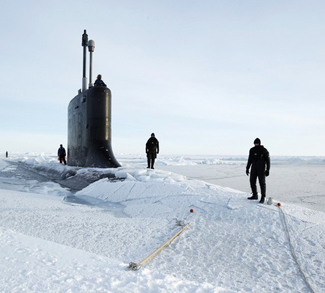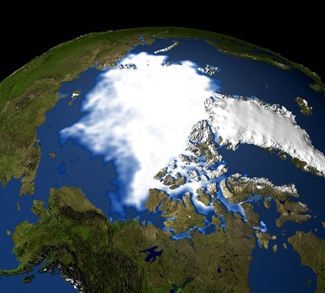FORECAST
While the usual international posturing on the Arctic continues unabated, signs are beginning to emerge that Canada and the United States might be able to put their differences behind them.
The United States and Canada have just begun a five-week bi-national survey of Arctic waters that are claimed by both states. It is hoped that the information gathered by the survey will be used to bolster both countries’ claims to the United Nations Commission on the Limits of the Continental Shelf (CLCS). More importantly though, the information could be used to help bring about a bi-national agreement on the disputed Beaufort Sea maritime border, which stands as a major impediment to US-Canada cooperation in the Arctic.
One factor putting pressure on both Washington and Ottawa to come to a quick negotiated solution is the presence of vast energy deposits in the disputed area. Canada’s National Energy Board has pegged the size of the reserves at 1.7 billion cubic meters of natural gas and over 1 billion barrels of oil. Of course, more rigorous exploration and eventual drilling cannot proceed until the border issue has been resolved. But given the solid case that can be made by both sides, it is likely that both will want to make a push towards a resolution before the year is out. Such a deal would almost certainly have both sides coming away happy.
One potential sticking point however is Washington’s stance on the Northwest Passage being classified as international waters. It remains to be seen whether or not the United States can hammer out a deal on the Beaufort maritime border without lending some support to Canadian sovereignty claims on the Northwest Passage; an issue that is fast becoming an important point of national pride for the Canadian public.
Despite these unresolved conflicts, it’s only a matter of time before the United States and Canada synchronize their Arctic policies. A solid foundation for cooperation already exists. There is a lucrative bounty of mineral and energy reserves on both sides of the agreed-upon border, and the possibility of co-developing disputed areas is always a possibility. Strategically, the United States desire for naval mobility through the Northwest Passage could be maintained under the pretense of North American defense- though such a move would undoubtedly inflame Canadian public opinion.
Another possibility would be for NATO to classify the Arctic as a key strategic theatre, allowing for the free passage of the US Navy through Canadian Arctic waters. Ultimately for the US Navy, one of the aforementioned compromises is ideal because it would allow for their own safe travel without affording other future ‘blue sea’ navies a legal right to use the Northwest Passage.
Thus, expect the period of US-Canadian squabbling over the Arctic to be a short one. It is in both countries’ interest to adopt a united front and develop and secure the area together.
Zachary Fillingham is a contributor to Geopoliticalmonitor.com



